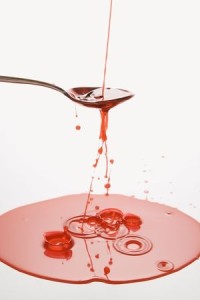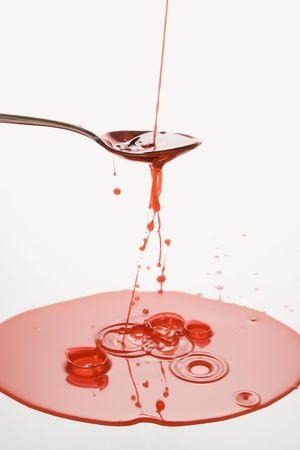
One of the most coincidental encounters I’ve ever had in my experiences working with addicts and alcoholics involved someone intending to get high on DXM. One day when I was on my lunch break, I went to a local supermarket to get some hot food from their deli counter. When I was about fifty feet from the automatic doors, one of the individuals I knew from the treatment program exited the store and immediately made a left when he saw me. I called out a hello, which he answered as he just kept walking, saying he had just bought something to eat. Normally a friendly person, his behavior was unusual.
I wondered what could be going on as I went into the store. Then for some reason, I had the thought to go check the isle with the over-the-counter cold medications. The section was completely empty of cough suppressant capsules containing DXM, dextromethorphan. After I bought my lunch, I walked in the direction I has seen him hotfoot it away from me earlier and now saw him coming out of a sandwich shop. Hmm, I thought, he must be really hungry today.
I told him what I had found in the grocery store and then reminded him he had told me he bought something to eat there. Now he had some thing else from the sandwich shop. I also showed him a plastic bag with the grocery store’s logo that contained empty boxes of DXM cough suppressant. I told him that it had been on the top of a garbage can just outside the sandwich shop. He said he bought a drink in the grocery store before buying his sandwich and denied any knowledge of the empty DXM shelves in the grocery store. Of course he didn’t know how the empty DXM packets got there either. Then he left to meet the person giving him a ride home.
Back at the outpatient office, as I was telling the other staff members the above story, he walked in admitted that he had bought the DXM capsules. He said he hadn’t taken any and after I confronted him, he threw his baggy of capsules away. We talked of how close he had come to a lapse into active drug use and I encouraged him to not waste this pretty amazing intervention. We both agreed it seemed to be a “God moment” that put me in front of the store just as he was coming out. The last I heard, he was abstinent; but it took a few more tries at treatment before he got it.
Dextromethorphan (DXM) is a synthetic substance found in about 70 over-the-counter products mainly as a cough suppressant and expectorant. Other medical uses include the other symptoms from hayfever, colds, allergies and the flu: the temporary relief of sinus congestion, runny nose, cough, sneezing, itching of the nose and throat, and watery eyes. DXM was approved by the FDA in 1958 as a cough suppressant. As early as 1962, it was being used recreationally. Ironically it had been substituted for codeine in cough suppressant medications to cut down on abuse. When it became a popular recreational drug with “young heads,” DXM was temporarily removed from the OTC market in 1973.
By 1977 pharmaceutical companies reintroduced DXM cough syrup with an unpleasant taste when used in the large quantities necessary for a high. Within a short time those same manufacturers began to produce forms of DXM syrup with an “appealing flavoring.” Used as prescribed, DXM products do not lead to the altered states sought after by those who abuse it. Doses approximate 30 mg of DXM every four to six hours. A single recreational dose can range from 240 to 1500 mg. “Heavier users have been known to ingest up to 3 or 4 bottles a day.”
In high doses, DXM is a dissociative anesthetic with powerful psychedelic effects. Sometimes it is compared to PCP and ketamine, two other dissociative anesthetics. High dose DXM can lead to toxic psychosis and a host of other physiological and behavioral problems. See the link above and Medline Plus for further information and treatment for DXM overdose.
Dose dependent effects can vary from a mild stimulant effect with distorted visual perceptions to a sense of complete dissociation from your body. A bad DXM experience described on the pro-drug website Erowid said: “My DXM experience was even scarier than my shrooming experience when I thought that I’d lost my face and that I would never return from being completely and utterly confused.”
DXM abuse is largely done by teens looking for a cheap, accessible high. The guy I described above was in his early 20s. Katie McBride, writing for The Fix, described how one teenage boy named Nic had two nearly fatal DXM overdoses in “The Dangers of DXM.” She related information on the SAMHSA website from 2006 that reported an estimated 1 million people between the ages of 12 and 25 had abused OTC cough and cold medication in the previous year. I was not able to find more recent data on DXM or abuse of OTC cough and cold medication. Although there has been data gathered on nonprescription cold and cough medications, since 2006 it was not included in the annual National Surveys on Drug Use and Health (NSDUH).
Beginning in 2006 Monitoring the Future, an ongoing study of the behaviors, attitudes and values of American high school students, began tracking the use of DXM among 8th, 10th, and 12th grade students. Respondents were asked how often they used cough or cold medications to get high in the past year. All the surveyed grade levels reported decreased use from 2006 to 2014. The percentages in 2006 who had used DXM were as follows: 8th graders: 4.2%; 10th graders: 5.3%; 12th graders: 6.9%. By 2014, the percentages were: 8th graders: 2.0%; 10th graders: 3.7%; 12th graders: 4.1%.
The DXM Abuse Prevention Act of 2015 (H.R. 3250) has been introduced to amend the Federal Food, Drug and Cosmetic Act. H.R. 3250 would restrict the sale of DXM products to individuals under the age of 18, except with a valid prescription. Retailers would have to verify that they are not selling DXM to individuals under 18. It would also create a series of penalties for retailers violating the sales restrictions to under aged individuals. The FDA Law Blog reported:
In determining civil penalty amounts for violations, the bill would require consideration of whether the retailer “has taken appropriate steps to prevent subsequent violations,” including establishing a documented training program for all employees who sell dextromethorphan. The bill has received strong support by a number of anti-drug abuse, healthcare and industry organizations including the Consumer Healthcare Products Association, Drug Abuse Resistance Education (“D.A.R.E.”) and Partnership for Drug-Free Kids.”
According to the Monitoring the Future data, DXM use among teenagers has been decreasing. But we should keep in mind that 2% to 4.1% of high school students using DXM in the past year to get high is still a significant number. I’m not sure that H.R. 3250 will ever get out of committee and become law, but it has some good ideas, like restricting the sale of DXM products to individuals over 18, unless they have a prescription. The restrictions on pseudophedrine seem to work in keeping it out of the hands of wanna-be Walter Whites. Something similar should work with DXM products as well.





